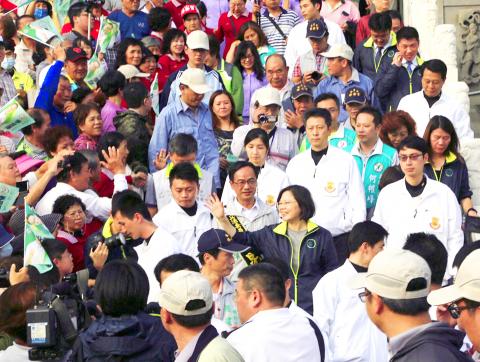More than 350 candidates are to vie for 73 directly elected seats in the legislative elections on Saturday next week, the Central Election Commission announced yesterday.
A total of 354 legislative district candidates have registered to compete in the nation’s 73 electoral districts, a number that is more than 30 percent higher than the 269 candidates who competed in the 2012 elections.
Several new parties have also nominated candidates to run in the legislative elections, including the New Power Party, the Republican Party, and the Faith and Hope League.

Photo: CNA
Many of the parties were formed last year out of disappointment with the performances of larger parties.
The Legislative Yuan has a total of 113 seats. In addition to the 73 legislative seats up for election in “first-past-the-post” campaigns, there are six seats reserved for Aboriginal candidates and the remaining 34 seats are for legislator-at-large candidates.
There are 23 Aboriginal candidates competing for the six seats.
The legislator-at-large seats are to be allocated in proportion to the total number of votes a party gets, but it must receive at least 5 percent of the vote to qualify for a seat.
A total of 18 political parties are competing for legislator-at-large seats, including the Chinese Nationalist Party (KMT), the Democratic Progressive Party (DPP), the Taiwan Solidarity Union (TSU), the People First Party (PFP) and the Non-Partisan Solidarity Union — all of which are now represented in the legislature.
In 2012, only 11 parties nominated candidates for legislator-at-large seats.
Because of the large increase in the number of participating parties, the size of the ballot paper to be used in the vote has increased to 73cm long and 15cm wide.
In the 2012 legislative elections, the KMT won 64 seats and the DPP garnered 40 seats. The PFP and TSU each won three seats, while the Non-Partisan Solidarity Union won two and the remaining seat went to an independent.

A preclearance service to facilitate entry for people traveling to select airports in Japan would be available from Thursday next week to Feb. 25 at Taiwan Taoyuan International Airport, Taoyuan International Airport Corp (TIAC) said on Tuesday. The service was first made available to Taiwanese travelers throughout the winter vacation of 2024 and during the Lunar New Year holiday. In addition to flights to the Japanese cities of Hakodate, Asahikawa, Akita, Sendai, Niigata, Okayama, Takamatsu, Kumamoto and Kagoshima, the service would be available to travelers to Kobe and Oita. The service can be accessed by passengers of 15 flight routes operated by

Chinese spouse and influencer Guan Guan’s (關關) residency permit has been revoked for repeatedly posting pro-China videos that threaten national security, the National Immigration Agency confirmed today. Guan Guan has said many controversial statements in her videos posted to Douyin (抖音), including “the red flag will soon be painted all over Taiwan” and “Taiwan is an inseparable part of China,” and expressing hope for expedited reunification. The agency last year received multiple reports alleging that Guan Guan had advocated for armed reunification. After verifying the reports, the agency last month issued a notice requiring her to appear and explain her actions. Guan

GIVE AND TAKE: Blood demand continues to rise each year, while fewer young donors are available due to the nation’s falling birthrate, a doctor said Blood donors can redeem points earned from donations to obtain limited edition Formosan black bear travel mugs, the Kaohsiung Blood Center said yesterday, as it announced a goal of stocking 20,000 units of blood prior to the Lunar New Year. The last month of the lunar year is National Blood Donation Month, when local centers seek to stockpile blood for use during the Lunar New Year holiday. The blood demand in southern Taiwan — including Tainan and Kaohsiung, as well as Chiayi, Pingtung, Penghu and Taitung counties — is about 2,000 units per day, the center said. The donation campaign aims to boost

The Central Weather Administration (CWA) said a magnitude 4.9 earthquake that struck off the coast of eastern Taiwan yesterday was an independent event and part of a stress-adjustment process. The earthquake occurred at 4:47pm, with its epicenter at sea about 45.4km south of Yilan County Hall at a depth of 5.9km, the CWA said. The quake's intensity, which gauges the actual effects of a temblor, was highest in several townships in Yilan and neighboring Hualien County, where it measured 4 on Taiwan's seven-tier intensity scale, the CWA said. Lin Po-yu (林柏佑), a division chief at the CWA's Seismological Center, told a news conference